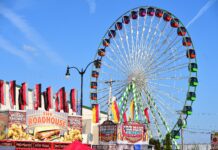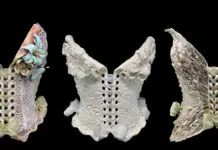A recent conversation with veteran singer-songwriter Don White recalled a star-packed but now virtually forgotten outdoor concert that Daily Oklahoman reporter Edwin Maloy dubbed “the Woodstock of country music.” It happened over the Labor Day weekend in 1975, 12 miles west of Atoka, on an outdoor site that had been cleared for the show. Depending on which newspaper reports one chooses to believe, it drew between 30,000 and 100,000 people – many of them circumventing the $10 ticket price and sneaking in – to see such country music stars as Willie Nelson, Waylon Jennings, Jerry Lee Lewis, Freddy Fender, Larry Gatlin, Don Williams, Red Steagall, Hoyt Axton, David Allan Coe and Freddy Weller, among others. The Woodstock-like antics of some in the crowd also drew strong condemnation in certain quarters; a week or so after the event, approximately 40 ministers from Cole and Atoka counties, along with Atoka County Sheriff Cecil Frazier, joined forces to make sure another edition of the concert they called “a disgrace to humanity” would never again happen on their watch.
For all of that, though, not many people seem to remember the massive alfresco shindig known as 48 Hours in Atoka. Even the famed country-music impresario Jim Halsey, whose huge, Tulsa-based agency booked the talent, only recalls that his company was involved with it, and “there were thousands of people there.”
Mr. Halsey can surely be forgiven for not remembering much about it, since he wasn’t at the event. Terry Cline, one of the many agents on board during that golden age of the Jim Halsey Company, actually did most of the booking – and one of the acts he booked was Tulsa’s Don White, who remembers the concert vividly.
He’s got every reason to. A Halsey Company client at the time, working with Cline, White not only did his own set with his band, but also backed up other acts. In fact, he and the group – Mike Bruce on guitar, Gordon Shryock on bass, and Gerad Goodwin on drums – logged more time on the Atoka stage than any of the other performers on the bill.
“Jeff and Bernard Bigby opened the show, I think,” White says. “They were friends of Terry Cline, and great guys. Then my band played. Then we backed up Johnny Duncan. Then we backed up Freddy Weller.
“We’re on that stage, and it’s a hundred degrees out there. Well, we started early, so maybe it was just 90,” he laughs. “They’d cleared out these woods, and they hadn’t left any grass. It was all just dirt. Dust. And it was real hot. So I did like three hours, and instead of drinking ice water, I had a couple of beers. We finished our third show, my show, Johnny’s show, and Freddy’s show, all back to back.
“There was this long ramp going up to the stage, and I was at the top, looking down at my wife at the time and (musician) Gordon Payne, who was there with Waylon Jennings. They looked up at me, and all of a sudden, they started running up the ramp, right at me. I thought, ‘Well, I wonder what they’re doing that for?’ And they caught me just as I fell.” As it turned out, White was suffering from heatstroke.
“They said my face was white as a sheet. And as they were helping me back to the motor home, Roy Head walked up to me and said, ‘Hey. I don’t have a band. Can I play with you guys?’ I went, ‘Ughough.’”
White managed to direct Head – the man best known for the 1965 Top 40 hit “Treat Her Right” – to his guitarist, Mike Bruce, to negotiate a price for their services. Twenty minutes later, “after they laid me down, cooled me down, and gave me a bunch of water,” White was back on stage with his band, backing up Head.
Head was sporting one of those ornate – and expensive – performing jackets made by the Nashville tailor Nudie, and Atoka turned out to be the last place he’d ever see it.
“He only did a short show, about 15 minutes or so,” recalls White. “But he had that jacket on, all beaded-up and fancy, and he got excited and pulled it off. He was swinging it, and then he threw it out into the crowd. Well, there are 35,000 people out there, right? So we finish the show, and we’re walking off, and he leans over to me and says, ‘You think they’d give me my jacket back?’”
White laughs again. “I said, ‘Oh, sure, Roy. You just go right out there and tell them you’d like to have it.’ It was either in shreds by that time, or someone was wearing it.”
After the event ended and the dust cleared, all kinds of allegations surfaced: The backers had taken a six-figure loss, everything was disorganized, some of the acts didn’t get the money they were due.
“All I know is, I worked my butt off, and I got paid,” White says, although he does relate a story about his brother, John “Punkin” Young, which indicates some backstage confusion. Young, who would later go on to work as road manager for acts like Asleep at the Wheel and Dwight Yoakam, was just beginning his show-biz career.
“He was hanging around the stage there, and before you knew it, he was running the stage, because he knew how to do it,” White says. “When someone needed something and everyone was just standing there going, ‘uhhh,’ he just took charge.
“I remember Jerry Lee Lewis came on, and when the first song started the bass player broke a string,” he adds. “My brother went over and got the other bass and had someone tune it, and then he took it out there. Well, for Jerry Lee, the last note of one song is the first note of the next song, and the bass player never got a chance to change basses. My brother was standing there with the bass on him, all ready, and he fell asleep before Jerry’s show was over.”
Four years later, a movie made of the event, titled simply Atoka, was booked simultaneously in 40 theaters across the state. Newspaper ads for the film asked, “Were you there in Atoka, Okla., when the last of the great outdoor concerts happened?” Panned by critics and described by White as “phony-looking,” the picture quickly disappeared and seems now to be a lost film.
White, however, is anything but lost. In addition to playing live, writing, and recording, he hosts a weekly radio show, “Music with A Groove,” which airs Sundays at 7 p.m. and again at 2 a.m. on KRSC, 91.3 FM and at www.rsuradio.com. Daddy Bo, his duet disc with his son, Steve White, has been riding high on the relatively new AirPlay Direct chart for Americana music, recently climbing into the Top Five.
“AirPlay Direct,” explains White, “measures the downloads from around the world, both Internet and regular radio stations.” A press release from Luna Chica Records, the disc’s distributor, cites airplay in Canada, Australia, New Zealand, Sweden, England, Uruguay, France and the Netherlands, as well as across America.
“I don’t know if we’re making any money,” White says, “but we’re sure out there.”

























